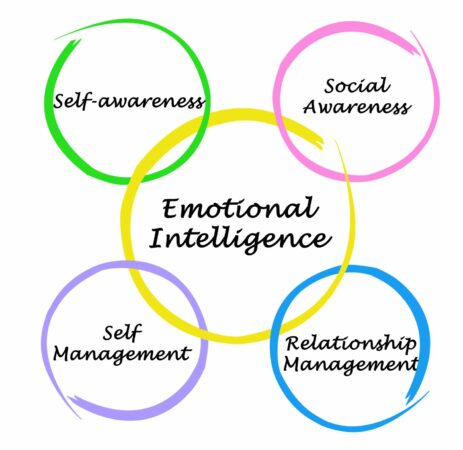How to help Your child develop Emotional Intelligence:
- Label your child’s emotions so they learn to recognize how they’re feeling – especially if they don’t have much of an emotional vocabulary yet. Ask them if you got it right by saying something like “Hey it looks or feels like you’re angry about that friend who said something rude to you, am I right?” Don’t just assume – help them build their emotional vocabulary.
- Show empathy toward them. Don’t minimize or offer solutions or your opinion- just be there, sit with whatever emotion they have going on, validate them even if you don’t agree. Do all this first before anything else. Otherwise, they’ll learn that what they are feeling is wrong. Lots of times our kids don’t want our opinions or lectures, they just want to be heard and seen. Much like we do. You can even ask- is this a time you’d like me just to listen or do you want advice? By showing them this, they will learn to do it with others.
- Model appropriate ways to express feelings. Share experiences in your everyday life by using descriptions with your emotional vocabulary. Studies show that emotionally intelligent parents are more likely to have emotionally intelligent children.
- Teach healthy coping skills which can include calming strategies like breathing, meditating, self-soothing using the five senses, or taking a walk to cool down. There is no one right way to do this, just whatever you discover works for you and your child. Teach them how to cheer themselves up by reminding them to cast their nets out to a wide circle of friends if feeling left out. Help them see the value in family time or enjoying alone time, journaling, self-compassion and self-care. Help them face their fears by sitting in/with uncomfortable situations or doing it with them.
- Teach problem-solving skills.
One such problem-solving skill, that comes from DBT (Dialectical Behavioral Therapy) is a great place to start.
The Problem-Solving skill can be very useful once we have determined that a problem has arisen, and it’s our problem to solve. Sometimes we experience unpleasant emotions about the actions of others or situations that we cannot change. This skill specifically helps us to collect the facts and take steps to solve a problem for which we can change.
There are a number of steps to effective problem-solving:
- Stop long enough to realize that a situation is a problem, and you may need time to find a resolution.
- Define the problem in detail. What is the situation? Who is involved? What is happening or not happening that is a problem? Where did it happen? When did it happen? How did it happen? How often does it occur? Why does it happen? How do you feel? What do you do in response? What do you want to change?
- Describe how the problem interferes with your goals. If the situation does not interfere with your goals, it is likely not your problem.
- Identify all the options/alternatives. It is important to find at least three potential solutions in order to avoid the black/white thinking we were programmed to use.
- Explore the consequences of each option/alternative. Seek additional knowledge if necessary.
- Identify the steps needed to resolve/take action. Make a list of when and how the steps will be taken and then take the required action.
- Evaluate the results. If the steps taken were successful to resolve the problem, acknowledge that you successfully solved a problem and give yourself some credit. If the steps taken were not successful to solve the problem, learn more about what would be needed to solve the problem and follow steps 4-7 again until the matter is resolved.
Remember that cultivating emotional intelligence is an ongoing goal. Practice self-love and know that even if your child doesn’t get all this right away, they are likely right where they are supposed to be development wise. We are so hard on ourselves as parents and think every mistake our kids make are a reflection of us when in reality, it’s just exactly what they’re supposed to be doing as they grow and develop. There are sometimes genetic, familial and other developmental factors that come into play making this harder to build in some children, and thus it may take more time.
If you have a daughter between the ages of 9 and 15 and would like help in cultivating her emotional intelligence, I will be teaching a course for girls with a parent to learn and practice these skills in a group of peers. The next section of Cultivating A Mindful Life With Your Daughter begins January 10, 2022 and runs for eight weeks on Mondays from 6-7 pm.



